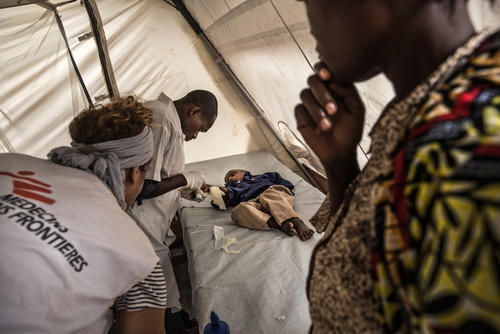In a complex and fast-changing world, we remain focused and resolute in pursuit of our goal – to provide the most appropriate, effective medicine in the harshest of environments. As well as responding to vital needs, our aid is born of a desire to show solidarity with people who are suffering, whether as a result of conflict, neglect or disease.
As a medical humanitarian association, our strength lies in our employees and volunteers, be they front-line workers or back-office staff, and all the other people who support our work, whether financially, technically, politically or otherwise. This shared commitment to those stripped of their basic rights is what binds us together.
Our strength is also grounded in mutual respect and transparency. We welcome the recent focus on abuse of power within society at large and the aid sector specifically. With tens of thousands of staff working in extreme conditions around the world, the need for each and every one of our patients and staff to feel safe to report and fight any form of abuse is something we take very seriously.
MSF employs people of around 150 different nationalities and this diversity is a source of strength. Combining an external eye with local knowledge improves the quality of our operations. It helps us get closer to the realities and needs of our patients and develop the best possible medical response. It also helps us to successfully negotiate access to the most vulnerable populations in some of the most difficult places. We must continually challenge ourselves and each other to ensure that the decisions we take are based on, and benefit from, the widest range of perspectives possible.
MSF teams around the world are constantly adjusting to the specific challenges of very different situations. As you will see from this report on our activities in 2017, we continue to tailor the care we provide to the diverse realities we work in: the realities of displacement, from the borders of Syria or Somalia to the deadly so-called migration routes of North Africa, the Mediterranean and Europe; the evolution of disease realities such as multidrug-resistant tuberculosis or epidemic outbreaks such as cholera and meningitis; and the conflict realities of the Middle East and Africa.
Despite the significant direct assistance our teams have been able to deliver, too many patients and communities – from Syria to Iraq, South Sudan and Nigeria, to name but a few – remain stuck in the epicentres of spiralling conflicts. The lack of any form of protection in such contexts all too often leaves us as powerless witnesses.
In such extreme realities, we continue to deploy what means we can. But we cannot do it alone. We rely on those who support our action. This generosity and compassion is what allows us to continue our lifesaving work.

















